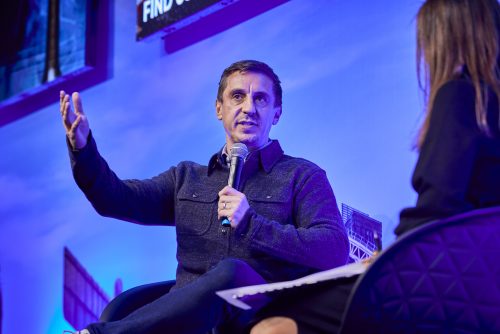‘Covid has been a true catalyst for digital transformation’

The global pandemic has been ‘a true catalyst for digital transformation.’
That was according to senior tech leaders during a three-day tech expo at Manchester Central.
Leaders including Jaz Chana, Technology Director at Cinch and Katie Gallagher, Managing Director at Manchester Digital commented on the rapid technology shift taking place and the demand for digital roles across all sectors.
Speaking to thousands of delegates at Digital Transformation EXPO (DTX), part of Manchester Tech Week, Chana said he believes that tech needs to be an enabler and leaders need to bring their teams to the work in order to innovate at speed.
He said: “It used to be that technology was a competitive advantage because only a small number of people had a good understanding of it.
“It’s ubiquitous now for every company, everyone is on the same stage. Technology is an equaliser, not a differentiator. Speed is your only real competitive advantage”.
Gallagher commented on the impact this is having in the search for talent.
There are currently 100,000 vacancies in the digital and technology sector every month in the UK according to according industry body techUK.
“This year is particularly interesting because we are dealing with the normal talent shortage as well as the pent-up demand post-COVID,” said Gallagher.
“There has been a massive drive through digital transformation, so the types of companies we work with have completely changed, it’s not just digital and tech companies – most companies now have a tech or digital capability.”
Football Pundit, Hospitality Entrepreneur & Former Manchester United Player, Gary Neville also spoke of his deep-rooted passion for digital inclusion and opportunity, which he believes must begin at the grassroots education level.
In his opening session, Neville made a case for disrupting the conventional, by changing school subjects to bring in new areas that align to modern job roles and build digital proficiency.
He said: “The use of social media should be a subject at school. Start to pull modern technologies into the curriculum so it adapts to one that really focuses on the jobs that are available in 2022.”
This was later echoed by Beena Puri, Innovation and Partnerships Lead at Greater Manchester Combined Authority, who said that the current curriculum is not fit for purpose.
Gary also addressed how we need to disrupt the crucial need for upskilling current staff to ensure they are able to thrive in digitally transformed working environments.
“We have a thriving tech sector in Manchester, but we have got a huge skill shortage. We need to retrain a lot of the over 40s to get them aligned with the jobs that are available.
“Whether it be in tech, crypto or blockchain and all the different areas that are going to come to the fore in the next five to ten years. We’ve got a huge retraining exercise to do,” he added.
John Hobson, VP and CIO at Kellogg Europe was clear that innovation has to be encouraged as a part of business culture – with people at the heart of this.
Hobson said: “We have an ambition that everyone has a seat at the table. We have a rich mix of backgrounds and experiences and I truly believe that if you bring these people together with high standards who can bring different ways of thinking – that’s where the magic happens.”
The event brought initiatives within large national organisations to life.
Attendees heard from Co-Op Bank’s Head of UX & Optimisation, Becky Franks and Service Designer, Kerry Newton sharing insight into its Digital Bees initiative that connects colleagues to the community.
These projects work to increase digital confidence, address the skills gap and encourage people from all backgrounds to pursue careers in tech, as well as supporting people in developing core digital life skills.





